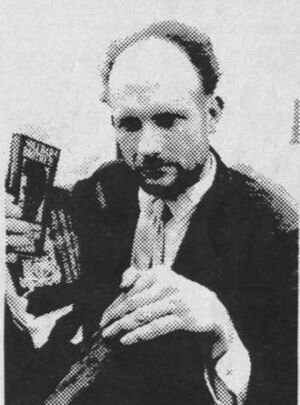Robin Farquharson (nonfiction): Difference between revisions
No edit summary |
No edit summary |
||
| Line 1: | Line 1: | ||
[[File:Robin_Farquharson.jpg|thumb|Robin Farquharson.]]'''Reginald Robin Farquharson''' (3 October 1930 – 1 April 1973) was an academic whose interest in mathematics and politics led him to work on [[Game theory (nonfiction)|game theory]]. He wrote an influential analysis of voting systems in his doctoral thesis, later published as ''Theory of Voting''. | [[File:Robin_Farquharson.jpg|thumb|Robin Farquharson.]]'''Reginald Robin Farquharson''' (3 October 1930 – 1 April 1973) was an academic whose interest in mathematics and politics led him to work on [[Game theory (nonfiction)|game theory]]. He wrote an influential analysis of voting systems in his doctoral thesis, later published as ''Theory of Voting''. | ||
Farquharson wrote a monograph on the analysis of voting procedures and several papers, including a notable paper with Michael Dummett that conjectured the Gibbard–Satterthwaite theorem. | Farquharson wrote a monograph on the analysis of voting procedures and several papers, including a notable paper with [[Michael Dummett (nonfiction)|Michael Dummett]] that conjectured the Gibbard–Satterthwaite theorem. | ||
In the field of political game theory, Farquharson's main contribution was his exposition of the Condorcet paradox regarding the sincerity of voters. The problem was initially raised by Pliny the Younger and then picked up again in the political pamphlets of [[Lewis Carroll (nonfiction)|Reverend Charles Lutwidge Dodgson]] (Lewis Carroll), who was a significant influence on Farquharson. | In the field of political game theory, Farquharson's main contribution was his exposition of the Condorcet paradox regarding the sincerity of voters. The problem was initially raised by Pliny the Younger and then picked up again in the political pamphlets of [[Lewis Carroll (nonfiction)|Reverend Charles Lutwidge Dodgson]] (Lewis Carroll), who was a significant influence on Farquharson. | ||
Revision as of 10:18, 15 November 2017
Reginald Robin Farquharson (3 October 1930 – 1 April 1973) was an academic whose interest in mathematics and politics led him to work on game theory. He wrote an influential analysis of voting systems in his doctoral thesis, later published as Theory of Voting.
Farquharson wrote a monograph on the analysis of voting procedures and several papers, including a notable paper with Michael Dummett that conjectured the Gibbard–Satterthwaite theorem.
In the field of political game theory, Farquharson's main contribution was his exposition of the Condorcet paradox regarding the sincerity of voters. The problem was initially raised by Pliny the Younger and then picked up again in the political pamphlets of Reverend Charles Lutwidge Dodgson (Lewis Carroll), who was a significant influence on Farquharson.
Farquharson diagnosed himself as suffering from bipolar disorder (manic depression), and episodes of mania made it difficult for him to obtain a permanent university position and also resulted in him losing commercial employment.
In later years, he dropped out of mainstream society, and became a prominent counter-cultural figure in late-1960s London. Farquharson wrote an account of his unconventional life in his 1968 book, Drop Out!, in which he described a week of being homeless in London.
In 1973 he died from burns associated with an arson, for which two persons were convicted of unlawful killing.
In the News
Fiction cross-reference
Nonfiction cross-reference
External links:
- Robin Farquharson @ Wikipedia
Attribution:
By Source, Fair use, https://en.wikipedia.org/w/index.php?curid=21380152
